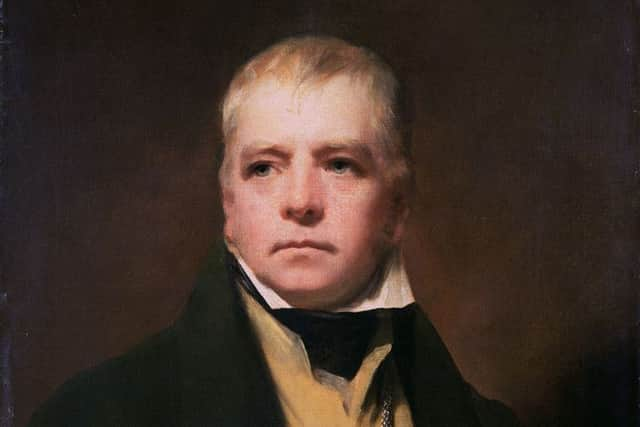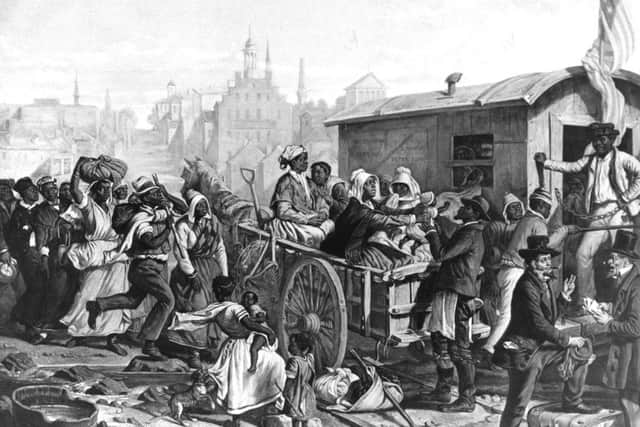Scottish slave owners 'inspired' by Sir Walter Scott, claims Neil Oliver
This article contains affiliate links. We may earn a small commission on items purchased through this article, but that does not affect our editorial judgement.


Thousands of Scots, forced from their own lands in the 1700s, emigrated to the Southern states of America looking for a new life.
But settlers’ simple lives were transformed at the end of the 18th century by the arrival of cotton - with a number of Scots becoming plantation owners.
Advertisement
Hide AdAdvertisement
Hide AdThe cash crop offered an easy life for some Scots, but as the industry grew so did slavery, and by 1810 there were 1.2 million slaves in the US - double what it was 20 years earlier. new


Historian Neil Oliver, in a BBC Two Scotland programme Scotland and the Klan, to be broadcast tomorrow night (Tue), claims it was Scott’s romantic novels that provided “the balm” that made their lifestyles, and slavery, seem legitimate.
One slave owner, William Wallace MacLeod, lived in a mansion just outside Charleston, South Carolina, called “Inverness”, and had up to 100 slaves on his plantation.
Planters wanted to give the impression of affluence, and the most striking display of wealth at that time was measured by the number of slave cabins that lined the drive to the house.


Advertisement
Hide AdAdvertisement
Hide AdOliver said: “By the mid 1800s, almost every house like this would have contained some of the many romantic novels of Sir Walter Scott.
“Scott’s stories of gallant knights and brave Highlander set in a golden mythical past were wildly popular, but according to the American writer Mark Twain they merely fed this fantasy lifestyle.
“Twain thought the planters were modelling their lives on Scott’s romantic vision of the old country, imagining themselves as lairds of their own clan.


“He wrote that the civilisation of the south in the 19th century is curiously confused and commingled with the Walter Scott middle age sham civilisation -- the inflated speech and the jejune romanticism of an absurd past that is dead and out of charity ought to be buried.”
Advertisement
Hide AdAdvertisement
Hide AdOliver said the slave trade saw descendants of many oppressed and downtrodden refugee Scots “taking the path of racism to become oppressors themselves.”
Heather Williams, Professor of Africana Studies at the University of Pennsylvania, tells the programme: “I think that for many people it felt as though it was something they were entitled to.
“I think that sense of entitlement then passed from generation to generation -- the sense that you are supposed to have more than other people, and that some people are supposed to serve and you are to be served.”


Oliver explains how Scott’s heroic romanticism had also been blamed in part for the four year civil war that followed.
Advertisement
Hide AdAdvertisement
Hide AdHe said: “The northern states had wanted to limit the expansion of slavery, just as the worldwide demand for cotton was booming. Southern state planters like William MacLeod, saw their whole lifestyle threatened and were willing to fight for it.”
Oliver said he had often celebrated the disproportionate impact Scots have had on the history of other countries. However, in the hourlong documentary he examines a dark chapter in Scotland’s international legacy - the links between racism today in the American Deep South and the Scots who first occupied it.
Following the defeat of the southern states in the civil war, it was six former Confederate officers of Scottish and Irish descent who formed a fraternal society that became the race hate group the Ku Klux Klan.
* Scotland and the Klan is on BBC Two Scotland, tomorrow (Tuesday) at 9pm.
DOWNLOAD THE SCOTSMAN APP ON ITUNES OR GOOGLE PLAY
